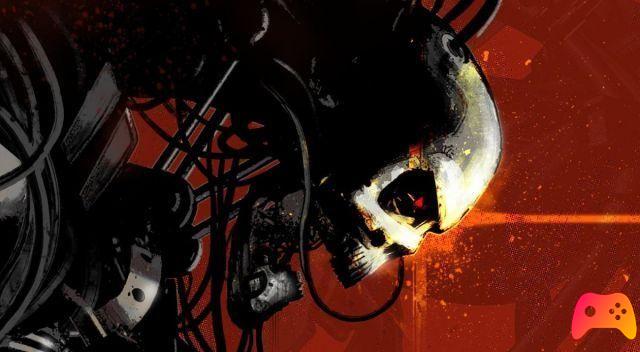
Review for Observation. Game for PC and PlayStation 4, the video game was released on 21/05/2019
Bring her. It is with these enigmatic two words that (almost) Observation begins, the last title of No Code, developed by Devolver Digital. Before talking to you about the plot or gameplay we would like you to follow us in this little pindaric flight: imagine Gone Home and The Witness met on a blind date at a mega-marathon from 2001: A Space Odyssey, Alien and Interstellar; if this union could generate a hypothetical living entity, well… it would be Observation.

Do we have your attention?
Well, now be ready to give us your curiosity too: a team of 11 people managed to conceive and, even more extraordinary, create a title that has nothing, absolutely nothing, to envy to the triple A who try (and sometimes succeed) to penetrate the dense fog of entertainment that surrounds us; it is a fog that is denser every day, so much so that the only thing more difficult than getting out of it is to leave a footprint on the ground on which it weighs; leave an imprint on the present, on the market, on us.

Observation is this and much more; it is the daydream of a videogame reality that has no intention of entering lightly into that good night; it is the anti-utopian utopia of a market in which Fortnite and Call of Duty make the most noise, but at the price of being the furthest creations from true and ineluctable memorability.
A spaceship in space, adrift. The protagonist Emma Fisher wakes up, and we with her. Memory? Lost. Where we are? It's unclear, but definitely off course. Who we are? The correct question would be "WHAT are we?". Like any self-respecting spaceship, the Observation (yes, that's the name of the ship) is equipped with a sort of AI, put at the reins of the most complex and meticulous aspects of space travel. A less brave game would have put us in Emma's shoes, but Observation is anything but pedibus calcantibus. In one of the most original twists of recent times, we will wear the guise of this complex artificial intelligence, which bears the name of SAM. It will be Emma and SAM, collaborating, who will have to put together the pieces of their current dangerous situation; they will find themselves exploring an almost completely abandoned space station, without the shadow of the crew that lived there until recently; in the role of SAM we will have to re-learn our computer skills, regaining control of the station one piece at a time and trying to shed some light on what's going on. To complicate things, there will also be a disturbing black octagon that appears out of nowhere and disappears into nothingness in an attempt to communicate with us.
Saying more of the plot would ruin the narrative rollercoaster No Code has in store for you; a sail of about ten hours which, having reached the end credits, it will leave you speechless and staring into space trying to understand something.

If we're avoiding spoiling the story, don't expect as many scruples on the gameplay side. Observation in this really manages to reinvent (at least in part) the wheel, introducing game mechanics that until now had rarely manifested themselves in the already rather colorful landscape. Being SAM confines us to the ship's complex IT infrastructure: we are every camera, we have access to every pc, we can scan every document; to stop for a moment you can easily imagine a thousand scenarios in which restricting the player to this dimension could simply not work, but the guys from No Code manage not to make us weigh the imprisonment of this fourth metanarrative wall. Giving us the true power of an artificial intelligence without reins is difficult to conceive and titanic to achieve, in fact, here comes the limitation given by history to put some chain in it; the station has seen better days, SAM is not at its full potential and apparently in the construction of the Observation Houston has spared some expense.
Each interaction that we can perform in the role of SAM requires the identification of the system or mechanism on which our action is required or necessary, different from time to time, followed by pressing specific keys, sometimes in the context of "spatial" puzzles, others driven by anxiety-inducing countdowns. While the mechanics of connection with most of the devices on board require the insertion of a specific and simple 3-digit code, we will find ourselves in different situations in which something more will be required, from the identification of a celestial body to of a spatial map, to the consultation of vital signs and other information, to the reworking of fractured fragments of our virtual memory to advance in the regeneration of the complex patchwork that SAM was before the events that start the adventure. Often the title has given us back vibrations from "Memento", Nolan's masterpiece: as we reconstruct the story, we realize that perhaps not everything is what it seems, especially with regard to our role in the affair.

It is in this, as in the exploration of the station, that the influence of titles such as Gone Home and What remains of Edith Finch is felt most: with the work of Fullbright from 2013, the boys of No Code almost certainly have to share the innate ability to make us feel uncomfortable but without allowing us to be able to understand because, with that feeling of imminent danger that never comes, a sort of "Desert of the Tartars" in space; with the story of Edith Finch, on the other hand, a parallel can certainly be drawn in terms of level design, since as in the title of Giant Sparrow each hub of which the station is composed manages to tell a story, dipping the narrative brush in the watercolor of a game world that shows, instead of actively telling.
Each log, each document, each recording adds pieces to the puzzle, managing to combine the macro-narrative context of a drifting space station with the micro-dramas of what is basically, and as always, the story of ordinary people in contexts. extraordinary.
Certainly the characterization of each room is less colorful than that of the various lodgings of which the house of "What remains of Edith Finch" was constituted, yet it is difficult not to appreciate the attempt to make each square meter of the station unique, even within the limits of its mandatory contextualization in real life. It is only a few free exploratory sections that leave us baffled, also given the path that the gameplay has made up to that moment; though in most situations Observation manages to shift gears as soon as the connection loop to the devices risks becoming stale, the transition to a vaguely free-roaming exploration tranche is just a carpet pulled from under our feet violently.

These are the parts where, despite everything, the virtual wall that the creators have set is most perceived, a sort of revelation of the Wizard of Oz behind the curtain; nonetheless, they are quite short sections compared to the main game core and you get used to this change quickly when it happens again.
The game world also features several collectibles, more traditional than the originalities expressed so far: audio recordings, documents, photos, are apparently superfluous components, but they manage to round the edges of a title that makes environmental storytelling its strong point. ; being able to perceive likes and dislikes among the various crew members, doubts regarding their mission or the reliability of those who guide them, makes it alive, or at least lived, a space defined more by the absence of those who should inhabit it than by the presence of what still remains there.

The rooms are well cared for and, as already mentioned, each very characteristic compared to the others, but the greatest delight for your eyes certainly comes when you move out of the station, addicted spectators with wide open mouths of a space that can never really cease to fascinate, both for the vastness of his being and for the silent ease with which he makes us aware of our universal smallness. If the graphics attract, even within the limits dictated by the narrative context, it is absolutely the sound that best returns the sense of loneliness and extra-terrestriality of the title of No Code, with a literally minimalist soundtrack, galaxies of silence and constellations of white noise; it is this para-everyday acoustic that makes you feel the most inside and at the same time outside our comfort zone.
Each silence of Observation succeeds in expressing more the absence of a sound than the mere mute melody of an uninhabited space station: it is again what is not there to be perceived, forcing us to live acoustically also with this sense of expectation of the inevitable , this perception of looming horror but without a real and final cathartic outlet. Telling you more would really mean ruining many of the surprises that Observation can give you, as we believe it is a truly worthwhile experience. It is not a title without flaws, but it is fair to consider it in the perspective of the titanic and successful effort by a team of 11 people, a few dozen minds who have been able to reinvent hackneyed puzzle-solving mechanics by putting us in the the role of a truly exceptional supporting actor, all without giving up a multi-structured narrative voyage that lends itself well to multiple reinterpretations and keys of interpretation.

Observation raises the walking-simulator genre, succeeding where few had dared until now: Space is the context and pretext for a respectable science fiction journey, a slow but inexorable locomotive on the tracks of environmental storytelling and the "show, don't tell ”still too absent from contemporary mainstream videogame frequencies. No Code and its Observation do not enter lightly in that good night but they rebel, they rebel against the extinguished light.
► Observation is an indie type game developed and published by Devolver Digital for PC and PlayStation 4, the video game was released on 21/05/2019






